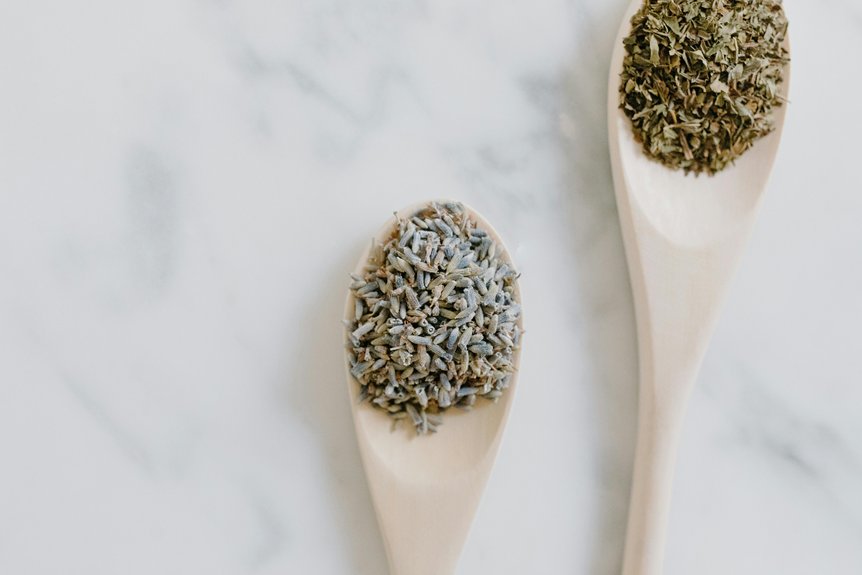
Many people think extra virgin olive oil isn’t suitable for cooking due to its low smoke point, but that’s a misconception. In reality, it can handle moderate heat, making it a versatile option for various dishes. However, not all olive oils deliver the same health benefits. So, how do you choose the right type and make the most of this flavorful oil in your kitchen? Let’s explore the facts and myths surrounding olive oil together.
The Nutritional Profile of Olive Oil
When you think about healthy cooking oils, olive oil often tops the list due to its impressive nutritional profile. Packed with monounsaturated fats, it supports heart health and may help manage cholesterol levels. You’ll find antioxidants like vitamin E and polyphenols, which contribute to overall wellness. Olive oil also boasts anti-inflammatory properties, making it a great choice for your daily cooking needs.
Another perk? Its versatility! Whether you’re drizzling it on salads or using it for sautéing, olive oil enhances flavors without sacrificing nutrition. Plus, you can easily incorporate it into various cuisines, from Mediterranean to Asian. Choosing olive oil empowers you to make healthier choices in the kitchen, liberating your meals from unhealthy fats. Additionally, Gundry MD Olive Oil, sourced from Moroccan olive trees, offers up to 30 times more polyphenols than average extra virgin olive oil, maximizing your health benefits. So, why not embrace it?
Health Benefits of Olive Oil
Olive oil isn’t just a delicious addition to your meals; it also offers a range of health benefits that can enhance your overall well-being. Rich in monounsaturated fats, it may support heart health by reducing bad cholesterol levels. Its powerful antioxidants, like vitamin E and polyphenols, help combat inflammation and protect your cells from damage. Regularly incorporating olive oil into your diet could even lower your risk of chronic diseases, including heart disease and certain cancers. Plus, its unique compounds might improve brain function and promote healthy aging. So, drizzle it over salads or use it in cooking—your body will thank you for choosing this liberating, healthful option! Enjoy the flavors while reaping the benefits of nature’s liquid gold.
Different Types of Olive Oil: Which Should You Use?
What type of olive oil should you choose for cooking? Extra virgin olive oil (EVOO) is the gold standard. It’s unrefined, retains more nutrients, and boasts a rich flavor that enhances your dishes. Use it for dressings, dips, or drizzling over finished meals.
For high-heat cooking, regular olive oil is a versatile option. It’s refined, has a milder taste, and works well for sautéing or baking.
If you’re looking for something budget-friendly, light olive oil can be your go-to. Despite its name, it’s lighter in flavor, not calories, and is suitable for various cooking methods.
Ultimately, choose based on your taste preferences and cooking needs to enjoy the full benefits of this liberating ingredient!
The Smoke Point of Olive Oil: What You Need to Know
Have you ever wondered how the smoke point of olive oil affects your cooking? Knowing this can empower your culinary choices. The smoke point is the temperature at which oil starts to smoke and break down, releasing harmful compounds and altering flavor. Extra virgin olive oil has a smoke point around 375°F, while refined olive oil can reach about 465°F. For sautéing or light frying, extra virgin is great, but for high-heat methods like deep-frying, refined olive oil is a better option. By understanding these temperatures, you can access the full flavor potential of your dishes without compromising health. Choose wisely, and let your culinary creativity soar!
Olive Oil vs. Other Cooking Oils: A Comparison
When choosing cooking oils, it’s important to contemplate not only smoke points but also nutritional profiles and flavor. Olive oil stands out with its heart-healthy monounsaturated fats and antioxidants, making it a nutritious option. Compared to oils like canola or vegetable oil, which may contain unhealthy trans fats, olive oil is a superior choice for both health and taste.
Coconut oil, while trendy, has a higher saturated fat content, which can raise cholesterol levels. Avocado oil, similar to olive oil, boasts a high smoke point and healthy fats, but its flavor might not suit every dish. Ultimately, selecting the right oil depends on your cooking method and health goals. Embrace olive oil for its versatility and health benefits—it liberates your culinary creations!
Common Myths About Olive Oil Debunked
Is olive oil really as healthy as people say? You might’ve heard that it’s not suitable for high-heat cooking, but that’s a myth! Extra virgin olive oil can withstand moderate heat, making it versatile for various dishes. Another common misconception is that all olive oil is the same; however, quality varies greatly. Look for cold-pressed or first-press labels for the best health benefits. Some believe olive oil is purely fat; in reality, it’s packed with antioxidants and healthy monounsaturated fats that support heart health. Finally, don’t think it’s just for salads. You can use it in baking and sautéing! Embrace the versatility of olive oil and enjoy its numerous health benefits in your cooking!
How to Properly Store Olive Oil for Maximum Freshness
To fully enjoy the health benefits of olive oil, proper storage is key. Start by keeping your olive oil in a cool, dark place, away from heat sources and sunlight. Light and heat can degrade the oil, reducing its flavor and nutritional value. Choose a dark glass bottle or a tin container, as these protect the oil from light exposure. Make sure to seal the bottle tightly after each use—air can also harm the oil. If you’ve got a larger quantity, consider transferring a smaller amount to a more accessible container to reduce the frequency of exposure. Finally, always check for freshness; if it smells off or tastes rancid, it’s time to replace it. Enjoy your oil’s full potential!
Incorporating Olive Oil Into Your Diet: Tips and Recipes
How can you seamlessly incorporate olive oil into your daily meals? Start by embracing its versatile nature. Here are three easy ways to elevate your cooking:
- Salad Dressings: Whisk together olive oil, vinegar, and your favorite herbs for a fresh, flavorful dressing that liberates your greens.
- Drizzling: Finish roasted vegetables or grilled meats with a drizzle of high-quality olive oil to enhance flavors and add richness.
- Dipping: Serve warm bread with a bowl of olive oil infused with garlic and herbs for a simple yet indulgent appetizer.





